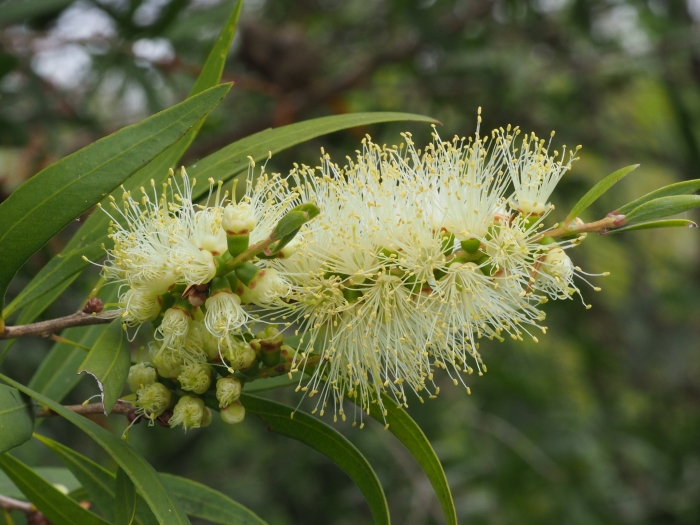Willow Bottlebrush
(Callistemon salignus)
Willow Bottlebrush (Callistemon salignus)
/
/

Geoff Derrin
CC BY-SA 4.0
Image By:
Geoff Derrin
Recorded By:
Copyright:
CC BY-SA 4.0
Copyright Notice:
Photo by: Geoff Derrin | License Type: CC BY-SA 4.0 | License URL: https://creativecommons.org/licenses/by-sa/4.0 | Uploader: Gderrin | Publisher: Wikimedia Commons | Title: Melaleuca_salicina_(Nana_Glen)_flowers.jpg | Notes: Transferred from Flickr by [[User:GiW]] |
















Estimated Native Range
Summary
Callistemon salignus, commonly known as Willow Bottlebrush, is an evergreen shrub or small tree native to the open woodlands and forest margins of Eastern Australia. It typically grows to 15 m (50 ft) in height, with a notable weeping habit resembling that of a willow. The foliage is soft, and the new growth emerges with a distinctive pink hue. The bark is white and papery, and the plant is known for its cylindrical spikes of white or creamy flowers that resemble a bottlebrush, which bloom in spring. These flowers are quite showy and are followed by woody capsules that contain the seeds.
Willow Bottlebrush is valued for its ornamental features, including its attractive bark and flowers, and its ability to attract birds with its nectar-rich blossoms. It is commonly used for screening and providing shelter due to its dense growth. It is also well-suited as a street tree or for planting in parks and gardens. While it can tolerate a range of soil types and moisture conditions, it is not frost-tolerant and should be protected from cold temperatures. In cultivation, it thrives in full sun and requires medium amounts of water, with best performance in soils with medium drainage. Care should be taken to avoid planting in areas with heavy frost, and it may require protection or suitable microclimate selection in cooler regions.CC BY-SA 4.0
Willow Bottlebrush is valued for its ornamental features, including its attractive bark and flowers, and its ability to attract birds with its nectar-rich blossoms. It is commonly used for screening and providing shelter due to its dense growth. It is also well-suited as a street tree or for planting in parks and gardens. While it can tolerate a range of soil types and moisture conditions, it is not frost-tolerant and should be protected from cold temperatures. In cultivation, it thrives in full sun and requires medium amounts of water, with best performance in soils with medium drainage. Care should be taken to avoid planting in areas with heavy frost, and it may require protection or suitable microclimate selection in cooler regions.CC BY-SA 4.0
Plant Description
- Plant Type: Shrub, Tree
- Height: 12-25 feet
- Width: 6-12 feet
- Growth Rate: Moderate
- Flower Color: Cream, Yellow, Green
- Flowering Season: Spring, Summer
- Leaf Retention: Evergreen
Growth Requirements
- Sun: Full Sun
- Water: Medium
- Drainage: Medium
Common Uses
Bee Garden, Bird Garden, Butterfly Garden, Drought Tolerant, Fragrant, Hedges, Hummingbird Garden, Low Maintenance, Potted Plant, Salt Tolerant, Street Planting
Natural Habitat
Open woodlands and forest margins
Other Names
Common Names: White Bottlebrush, Stonewood, Pink-Tip Bottlebrush, Pink-Tips
Scientific Names: , Callistemon salignus, Melaleuca salicina, Metrosideros lophantha, Metrosideros saligna, Callistemon lophanthus, Callistemon amoenus, Callistemon salignus f. hebestachys, Callistemon lanceolatus var. lophanthus, Callistemon leptostachyus
GBIF Accepted Name: Callistemon salignus (Sm.) Colvill ex Sweet